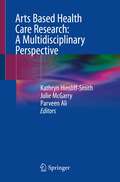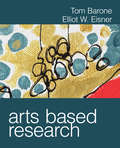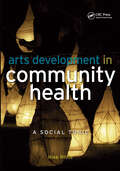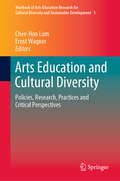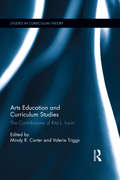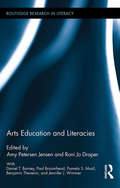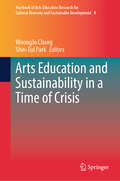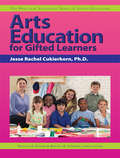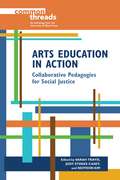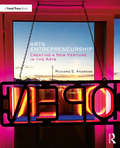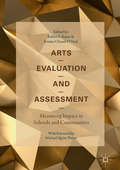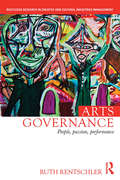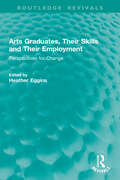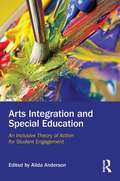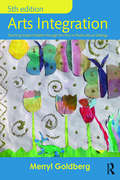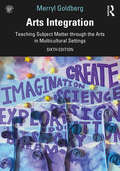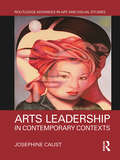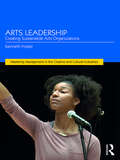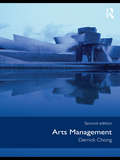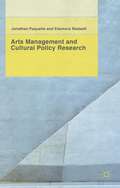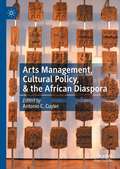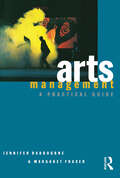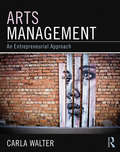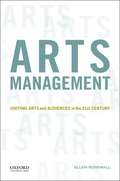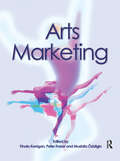- Table View
- List View
Arts Based Health Care Research: A Multidisciplinary Perspective
by Parveen Ali Julie McGarry Kathryn Hinsliff-SmithThis book, written by academics across a range of disciplines, including healthcare and social sciences discusses the increasing use of the arts in healthcare research, which often stems from the recognition that for some topics of investigation, or when dealing with sensitive issues, the usual qualitative or quantitative paradigms are not appropriate. While there is undoubtedly a place for such approaches, arts-based research paradigms (ABR) offers, not only additional study and data-collection tools, but also provides a new and enjoyable experience for those involved. The use of the arts as a medium to improve health and wellbeing was well documented by the World Health Organisation (WHO) in 2019, with over 3,000 studies conducted around the globe on the value of the arts in the prevention of ill health and promotion of health across the life span. This book examines how the arts, in a variety of forms, can be used by those working directly in healthcare settings as well as those involved in research across all health or patient settings. Covering a range of ABR genres, including literature (such as narrative and poetic inquiry); performance (music, dance, play building); visual arts (drawing and painting, collage, installation art, comics); and audio-visual and multimethod approaches, this user- friendly book will appeal to nurses, researchers in nursing and allied healthcare professions, as well professionals in the social sciences, psychosociology, psychology, literature and arts.
Arts Based Research
by Elliot W. Eisner Tom BaroneArts Based Research is ideal for students, researchers, and practitioners. This unique book provides a framework for broadening the domain of qualitative inquiry in the social sciences by incorporating the arts as a means of better understanding and rethinking important social issues. In the book′s 10 thought-provoking chapters, authors Tom Barone and Elliot W. Eisner--pioneers in the field--address key aspects of arts based research, including its purpose and fundamental ideas, controversies that surround the field and the politics and ethics involved, and key criteria for evaluation.
Arts Development in Community Health: A Social Tonic
by Mike WhiteThis book considers how and why the field of arts development in community health has come about, the characteristics of its practice and the challenges it poses for evaluation. It summarises what has been learnt from a number of case studies and other forms of research from the UK and elsewhere.
Arts Education and Cultural Diversity: Policies, Research, Practices and Critical Perspectives (Yearbook of Arts Education Research for Cultural Diversity and Sustainable Development #1)
by Chee-Hoo Lum Ernst WagnerThis peer-reviewed academic yearbook stems from the inaugural meeting of the newly formed UNESCO UNITWIN network on Arts Education Research for Cultural Diversity and Sustainable Development, held at the National Institute of Education, Singapore in April 2017. It presents international scholarly perspectives on issues related to arts education and cultural diversity in terms of: i) national and international policies; ii) terms, concepts and vocabularies; iii) current and ongoing research; and iv) best practices. The UNESCO UNITWIN is an arts education research think tank that gathers and leverages original research and critical commentaries on the arts and sustainable development from UNITWIN member states and beyond (Australia, Canada, Colombia, Germany, Hong Kong, Kenya, Korea, Israel, New Zealand, Singapore, Taiwan, the Netherlands and the United States of America).
Arts Education and Curriculum Studies: The Contributions of Rita L. Irwin (Studies in Curriculum Theory Series)
by Mindy R. Carter Valerie TriggsHighlighting Rita L. Irwin’s significant work in the fields of curriculum studies and arts education, this collection honors her well-known contribution of a/r/tography to curriculum studies in the form of arts based educational research and, beyond this, her contributions towards understanding the inseparability of making, knowing, and being. Together the chapters document an important beginning, as well as an ongoing transitional time in which curriculum understood as aesthetic text is awakening to the ways in which art practices stimulate a social awareness at the level of other embodied practices. Organized in three themes, gathering, transforming, and becoming, this volume brings together a selection of Irwin’s single and co-authored essays to offer a variety of rich perspectives to scholars and students in the field of education who are interested in the ways in which arts-based research allows the possibilities of bringing together the artistic, pedagogical, and scholarly selves of an educator.
Arts Education and Literacies (Routledge Research in Literacy)
by Amy Petersen Jensen and Roni Jo DraperIn a struggling global economy, education is focused on core subjects such as language arts and mathematics, and the development of technological and career-readiness skills. Arts education has not been a central focus of education reform movements in the United States, and none of the current education standards frameworks deeply address the processes, texts and literacies that are inherent to arts disciplines. This lack of clarity poses a problem for state and district leaders who might be inclined to advocate for the arts in schools and classrooms across the country, but cannot find adequate detail in their guiding frameworks. This volume acknowledges the challenges that arts educators face, and posits that authentic arts instruction and learning can benefit a young person’s development both inside and outside of the classroom. It presents ways that arts teachers and literacy specialists can work together to help others understand the potential that arts learning has to enhance students 21st century learning skills.
Arts Education and Sustainability in a Time of Crisis (Yearbook of Arts Education Research for Cultural Diversity and Sustainable Development #4)
by WoongJo Chang Shin-Eui ParkThis book is a result of the 4th UNESCO-UNITWIN Symposium that took place in Seoul, Korea, on May 25 and 26, 2021. Held online for the first time due to the Covid-19 pandemic, distinguished arts management and cultural education scholars addressed a timely array of issues, including the power of arts participation to transform behavior and perceptions, inclusivity in arts education, the disruptions and opportunities of the lockdown, the power of arts creativity in broader problem solving, the role of local arts educators on the transcultural horizon, and the role of international cooperation in reconstituting vibrant national arts scenes. Encompassing visual, written, and performance arts education from primary through higher education, this book provides a unique window into the power of the arts to meet the harrowing tests we continue to face in the context of the global pandemic. The book offers a unique perspective that is both international in scope and addresses local responses to an unprecedented global pandemic with an emphasis on the Korean and East Asian context.
Arts Education for Gifted Learners
by Jesse Rachel CukierkornArts Education for Gifted Learners provides information for teachers and parents interested in supporting an artistically talented child. It reveals the characteristics of artistically talented students, describes program options, and shares an approach for supporting the affective needs of these students. This is one of the books in Prufrock Press' popular Practical Strategies Series in Gifted Education. This series offers a unique collection of tightly focused books that provide a concise, practical introduction to important topics concerning the education of gifted children. The guides offer a perfect beginner's introduction to key information about gifted and talented education.
Arts Education in Action: Collaborative Pedagogies for Social Justice (Common Threads)
by Travis, Sarah; Stokes-Casey, Jody; Kim, SeoyeonArts educators have adopted social justice themes as part of a larger vision of transforming society. Social justice arts education confronts oppression and inequality arising from factors related to race, ethnicity, nationality, religion, class, ability, gender, and sexuality. This edition of Common Threads investigates the intersection of social justice work with education in the visual arts, music, theatre, dance, and literature. Weaving together resources from a range of University of Illinois Press journals, the editors offer articles on the scholarly inquiry, theory, and practice of social justice arts education. Selections from the past three decades reflect the synergy of the diverse scholars, educators, and artists actively engaged in such projects. Together, the contributors bring awareness to the importance of critically reflective and inclusive pedagogy in arts educational contexts. They also provide pedagogical theory and practical tools for building a social justice orientation through the arts. Contributors: Joni Boyd Acuff, Seema Bahl, Elizabeth Delacruz, Elizabeth Garber, Elizabeth Gould, Kirstin Hotelling, Tuulikki Laes, Monica Prendergast, Elizabeth Saccá, Alexandra Schulteis, Amritjit Singh, and Stephanie Springgay
Arts Entrepreneurship: Creating a New Venture in the Arts
by Richard AndrewsArts Entrepreneurship: Creating a New Venture in the Arts provides the essential tools, techniques, and concepts needed to invent, launch, and sustain a business in the creative sector. Building on the reader’s artistic talents and interests, the book provides a practical, action-oriented introduction to the business of art, focusing on product design, organizational planning and assessment, customer identification and marketing, fundraising, legal issues, money management, cultural policy, and career development. It also offers examples, exercises, and references that guide entrepreneurs through the key stages of concept creation, business development, and growth. Special attention is paid to topics such as cultural ventures seeking social impact, the emergence of creative placemaking, the opportunities afforded by novel corporate forms, and the role of contemporary technologies in marketing, fundraising, and operations. A hands-on guide to entrepreneurial success, this book is a valuable resource for students of Arts Entrepreneurship programs, courses, and workshops, as well as for early-stage business founders in the creative sector looking for guidance on how to create and sustain their own successful venture.
Arts Evaluation and Assessment: Measuring Impact in Schools and Communities
by Rekha S. Rajan Ivonne Chand O’nealThis book addresses the challenges faced by arts organizations, schools, and community-based settings when designing program evaluations and measuring artistic engagement and experience. With contributions from leaders in the field, this volume is an exemplary collection of complete program evaluations that assess music, theater, dance, multimedia, and the visual arts in a variety of contexts.
Arts Governance: People, Passion, Performance (Routledge Research in Creative and Cultural Industries Management)
by Ruth RentschlerSince the crisis in governance which led to a shortage of capable board members, recent years have seen the emergence of the enterprising arts organisation – a development which has led to the need for new types of board members who have a greater understanding of 'mission, money and merit' within a cultural construct. This innovative book explores the world of the arts board member from the unique perspective of the cultural and creative industries. Using a wide range of research techniques including interviews with board members and stakeholders, board observations and case studies this book provides a rich and deep analysis from inside the boardroom. It provides in-depth insight into the changing pressures on arts boards after the financial crisis, and focuses uniquely on the role of passion on arts boards. Part of the Routledge Research in Creative and Cultural Industries Management series, written specifically for people seeking to develop their careers in cultural and creative management, this book is also for people working in and with arts organisations, in government and non-profit arts organisations. It will also be of interest to academics and researchers working in the wider corporate governance field.
Arts Graduates, Their Skills and Their Employment: Perspectives for Change (Routledge Revivals)
by Heather EgginsOriginally published in 1992, this book was the first to gather together the view of industrialists, teachers and researchers. It focusses on the skills dimension of arts graduates which carry significant implication for all undergraduate programmes. It examines how the humanities and the world of work interact and how the relationship might be shaped in the future as the United Kingdom moved rapidly to a system of mass higher education. This book will be of use to all those responsible for enabling the new graduate of whatever subject to develop their skills and marketability to the full.
Arts Integration and Special Education: An Inclusive Theory of Action for Student Engagement
by Alida AndersonArts Integration and Special Education contributes to research, policy, and practice by providing a theory of action for studying how linguistic, cognitive, and affective student engagement relates to arts integrated learning contexts and how these dimensions of engagement influence content area and literacy learning. Arts Integration and Special Education connects the interdisciplinary framework in human development and linguistics, special education, and urban education with primary action research by special educators trained in arts integration, working in an inclusive urban charter school with middle school age students. Upper elementary to middle-grade level student learning is relatively understudied and this work contributes across fields of special education and urban education, as well as arts education. Moreover, the classrooms in which the action research occurs are comprised of students with a diverse range of abilities and needs. The book’s interdisciplinary model, which draws on developmental and educational psychology, special education, and speech/language pathology research and practice, is the first to posit explanations for how and why AI contexts facilitate learning in students with language and sensory processing disorders, and those at-risk for school failure due to low socioeconomic status conditions.
Arts Integration: Teaching Subject Matter through the Arts in Multicultural Settings
by Merryl GoldbergPractical and engaging, Merryl Goldberg’s popular guide to integrating the arts throughout the K-12 curriculum blends contemporary theory with classroom practice. Beyond teaching about the arts as a subject in and of itself, the text explains how teachers may integrate the arts—literary, media, visual, and performing—throughout subject area curriculum and provides a multitude of strategies and examples. Promoting ways to develop children's creativity and critical thinking while also developing communications skills and fostering collaborative opportunities, it looks at assessment and the arts, engaging English Language Learners, and using the arts to teach academic skills. This text is ideal as a primer on arts integration and a foundational support for teaching, learning, and assessment, especially within the context of multicultural and multilingual classrooms. In-depth discussions of the role of arts integration in meeting the goals of Title I programs, including academic achievement, student engagement, school climate and parental involvement, are woven throughout the text, as is the role of the arts in meeting state and federal student achievement standards. Changes in the 5th Edition: New chapter on arts as text, arts integration, and arts education and their place within the context of teaching and learning in multiple subject classrooms in multicultural and multilingual settings; Title I and arts integration (focus on student academic achievement, student engagement, school climate, and parental involvement–the 4 cornerstones of Title I); Attention to the National Core Arts Standards as well as their relationship to other standardized tests and arts integration; more (and more recent) research-based studies integrated throughout; Examples of how to plan arts integrated lessons (using backward design) along with more examples from classrooms’; Updated references, examples, and lesson plans/units; Companion Website: www.routledge.com/cw/goldberg
Arts Integration: Teaching Subject Matter through the Arts in Multicultural Settings
by Merryl GoldbergNow in its sixth edition, Merryl Goldberg’s popular volume Arts Integration presents a comprehensive guide to integrating the arts throughout the K-12 curriculum, blending contemporary theory with classroom practice. Beyond teaching about arts education as a subject in and of itself, the text explains how teachers may integrate the arts—literary, media, visual, and performing—throughout the subject curriculum, offering a wealth of strategies, techniques, and examples. Promoting ways to develop children’s creativity and critical thinking while also developing communications skills and fostering collaboration and community activism, Arts Integration explores assessment and the arts, engaging English Language Learners, and using the arts to teach academic skills in science, math, history, and more. This text is ideal as a primer on arts integration and a foundational support for teaching, learning, and assessment, especially within the context of multicultural and multilingual classrooms. In-depth discussions of the role of arts integration in meeting the goals of Title I programs, including academic achievement, student engagement, school climate, and parental involvement, are woven throughout the text, as is the role of the arts in nurturing Creative Youth Development work and its importance to the community. This revised and updated sixth edition combines a social justice emphasis with templates for developing lesson plans and units, updated coverage on STEAM education, along with brand new examples, case studies, and research. An expanded range of eResources is also available for this edition, including links to further resources readings, additional imagery and videos, and sample lesson plans.
Arts Leadership in Contemporary Contexts (Routledge Advances in Art and Visual Studies)
by Josephine CaustThis book explores and critiques different aspects of arts leadership within contemporary contexts. While this is an exploration of ways arts leadership is understood, interpreted and practiced, it is also an acknowledgement of a changing cultural and economic paradigm. Understanding the broader environment for the arts is therefore part of the leadership imperative. This book examines aspects such as individual versus collective leadership, gender, creativity and the influences of stakeholders and culture. While the book provides a theoretical and critical understanding of arts leadership, it also gives examples of arts leadership in practice.
Arts Leadership: Creating Sustainable Arts Organizations (Mastering Management in the Creative and Cultural Industries)
by Kenneth FosterThe contemporary world faces unprecedented upheaval and change forcing institutions of all types to rethink how they are designed and how they must now function if they are to survive into an uncertain future. The performing arts are no exception; in an era of constant change and technological transformation, arts organizations and their leaders face significant organizational challenges if they are to maintain their relevance. Arts Leadership: Creating Sustainable Arts Organizations provides a contemporary overview of the field of arts leadership, focused on the performing arts. It examines what these challenges are, how they are affecting the performing arts and arts organizations in general and proposes creative ways to reimagine, build and lead sustainable arts organizations in this uncharted environment. With a global perspective drawn from his extensive experience advising arts organizations around the world and based on his own work successfully leading important performing arts organizations in the United States, Foster proposes an innovative approach to organizational design, systems, and structures for arts leaders in the 21st century that is based in ecological thinking and the creative process that is intrinsic to the arts. In disrupting conventional arts leadership practice, the book provides an exceptional tool to understand a unique sector, and is essential reading for students and practitioners across the creative and cultural industries.
Arts Management
by Derrick ChongThe second edition of Arts Management has been thoroughly revised to provide an updated, comprehensive overview of this fast-changing subject. Arts managers and students alike are offered a lively, sophisticated insight into the artistic, managerial and social responsibilities necessary for those working in the field. With new cases studies and several new chapters, Derrick Chong takes an interdisciplinary approach in examining some of the main impulses informing discussions on the management of arts and cultural organizations. These are highly charged debates, since arts managers are expected to reconcile managerial, economic and aesthetic objectives. Topics include: arts and the State, with reference to the instrumentalism of the arts and culture business and the arts ownership and control of arts organizations arts consumption and consumers, including audience development and arts marketing managing for excellence and artistic integrity financial investing in the arts, namely fine arts funds and theatre angels philosophies of philanthropy Incorporating a deliberately diverse range of sources, Arts Management is essential reading for students on arts management courses and provides valuable insights for managers already facing the management challenges of this field.
Arts Management and Cultural Policy Research
by Jonathan Paquette Eleonora RedaelliPresenting concepts, knowledge and institutional settings of arts management and cultural policy research, this book builds on two assumptions that are simultaneously propositions. The first is that arts management research and cultural policy research evolve in an academic space that is very loosely connected, but nevertheless federated. The second is that we evolve in a field where there is a greater diversity of knowledge producers than it is often assumed. Practicing outside academia, many arts managers, policymakers, advocates, and other professionals still connect and mediate knowledge in spaces that are interconnected, and perhaps even more integrated than we would readily admit. This book offers a map, a representation of the concepts and spaces of knowledge production in the field. It constitutes an excellent introduction to students, and scholars and practitioners will find in it a renewed representation of the field and the seeds of an intellectual debate on our research community.
Arts Management, Cultural Policy, & the African Diaspora
by Antonio C. CuylerThis book centers people of African descent as cultural leaders to challenge the myth that they do not know how or care about managing and preserving their culture. Arts Management, Cultural Policy, & the African Diaspora also presents comparative case studies of the challenges, differences, similarities, and successes in approaches to cultural leadership across multiple cultural contexts throughout the diaspora. This volume disrupts the enduring and systemic global marginalization, oppression, and subjugation that threatens and undermines people of African descent’s cultural contributions to humanity. The most important distinguishing feature of the volume is its geographical use of the African diaspora to explore the subjects of arts management and cultural policy which, to date, no volume has done before. Furthermore, the volume’s comparative examination of ten critical, historical, practical, and theoretical questions makes it a significant contribution to the literatures in Arts Management, Cultural Policy, Cultural, Africana, African American, and Ethnic studies.
Arts Management: A practical guide
by Jennifer RadbourneArts management is no longer a resting place for enthusiastic amateurs or artists with insufficient talent to make the big time. Rather, it is increasingly being recognised as a profession with a set of skills which need to be learnt.Arts Management is a comprehensive handbook for arts administrators working in all art forms and in organisations ranging from small community co-operatives to large national flagships. With extensive Australian case studies, it covers cultural policy, fundraising, legal issues, marketing and public relations, managing people and money and event management.Arts Management is an essential reference for practising arts administrators and students.
Arts Management: An entrepreneurial approach
by Carla WalterArts Management is designed as an upper division undergraduate and graduate level text that covers the principles of arts management. It is the most comprehensive, up to date, and technologically advanced textbook on arts management on the market. While the book does include the background necessary for understanding the global arts marketplace, it assumes that cultural fine arts come to fruition through entrepreneurial processes, and that cultural fine arts organizations have to be entrepreneurial to thrive. Many cases and examples of successful arts organizations from the Unites States and abroad appear in every chapter. A singular strength of Arts Management is the author's skilful use of in-text tools to facilitate reader interest and engagement. These include learning objectives, chapter summaries, discussion questions and exercises, case studies, and numerous examples and cultural spotlights. Online instructor's materials with PowerPoints are available to adopters.
Arts Management: Uniting Arts And Audiences In The 21st Century
by Ellen RosewallDesigned for students and practitioners with little experience in not-for-profit management, Arts Management provides an indispensable guide to the theory and practice of managing arts and cultural organizations. This concise text engages readers with case studies and critical-thinking exercises that will develop their ability to adapt to a changing industry. From governance and human resources to program development, financial management, and marketing, Arts Management addresses the unique atmosphere of managing the arts today. It meets the standards of the AAAE (Association of Arts Administration Educators) guaranteeing that both current and future practitioners will be prepared to meet the challenges of managing today's arts organizations.
Arts Marketing
by Finola Kerrigan Peter Fraser Mustafa OzbilginArts Marketing focuses on a variety of sectors within the arts and addresses the way in which marketing principles are applied within these, outlining both the similarities and the differences that occur. Relating policy to practice, this contributed text demonstrates the most effective means of marketing in specific areas of the arts, with each chapter having been written by a specialist in the field. Although primarily focusing on the UK market, the subject has global relevance and appeal, and policy is evaluated on national, European and supranational levels. Specialist topics dealt with range from the marketing of the theatre, opera, and museums, through to the film industry and popular music.
